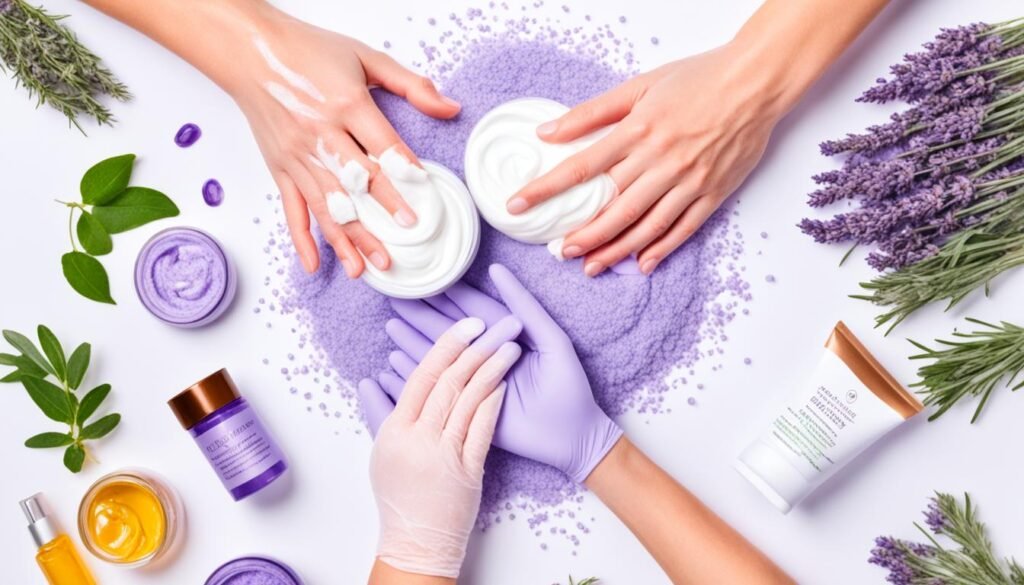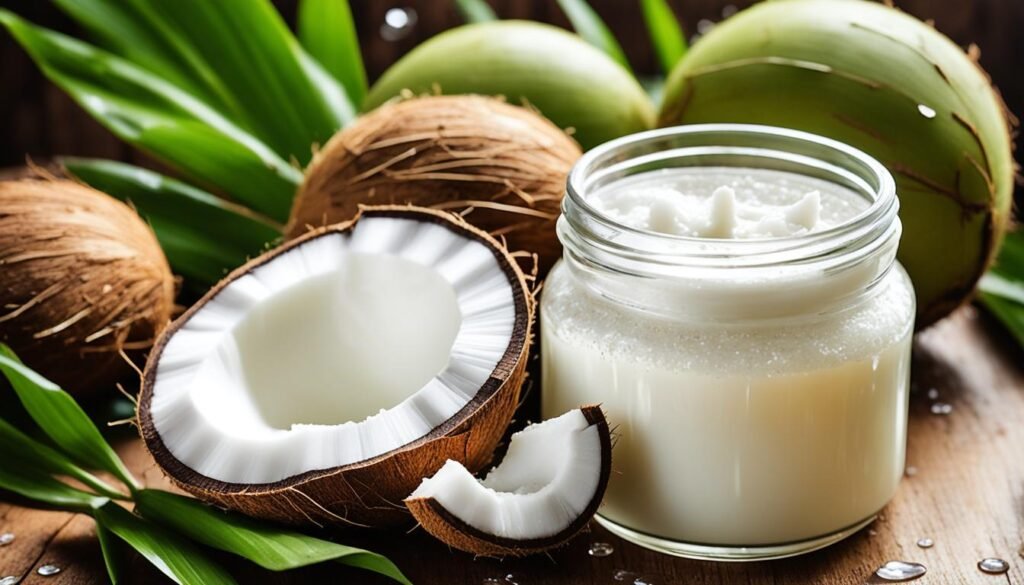Are you tired of dealing with dry, rough skin? Do you believe that commercial moisturizers are the only solution? Think again! There are natural remedies and DIY treatments that can effectively treat dry skin and give you the soft, smooth skin you desire. Discover the secrets to banishing dry skin and achieving a healthy, hydrated complexion.
Coconut Oil: A Versatile Remedy for Dry Skin
Coconut oil is a versatile and natural moisturizer that offers an array of benefits for dry skin. Its emollient properties make it an ideal remedy for those seeking effective dry skin solutions.
The secret behind coconut oil’s effectiveness lies in its unique composition. It contains saturated fatty acids that help hydrate and nourish the skin by filling the gaps between skin cells, resulting in a smoother and more supple complexion. This natural moisturizer can be used on various parts of the body, including sensitive areas like the delicate skin under the eyes and around the mouth.
What makes coconut oil even more appealing is its simplicity. You don’t need any additional ingredients or expensive products to reap its benefits. By incorporating coconut oil into your daily skincare routine, you can enjoy constant hydration and improved skin texture.
Coconut oil’s emollient properties make it an excellent choice for individuals with dry skin. Its ability to lock in moisture and restore the skin’s natural hydration levels provides long-lasting relief. Regular use of coconut oil can contribute to softer, smoother skin with a healthy glow.
In addition to its moisturizing qualities, coconut oil offers other benefits as well. It has antimicrobial properties that can help prevent infections, making it a versatile solution for various skin concerns. Its natural fragrance is pleasing to the senses, adding to the overall experience of using coconut oil in your skincare routine.
When choosing coconut oil for skincare purposes, opt for organic, cold-pressed, virgin coconut oil to ensure the highest quality and maximum benefits. Apply it gently to your skin, allowing it to absorb fully before dressing or going to bed.
Discover the wonders of coconut oil and say goodbye to dry, lackluster skin. Experience the natural hydration and emollient properties of this versatile remedy and enjoy the many benefits it brings to your skincare routine.
Petroleum Jelly: Healing Dry, Irritated Skin
When it comes to finding a healing remedy for dry, irritated skin, look no further than petroleum jelly, also known as mineral oil. This versatile product acts as a protective layer on the skin, creating a barrier that helps trap moisture and promote healing. Its moisturizing properties make it an ideal choice for providing relief from dryness and restoring the skin’s natural hydration.
Petroleum jelly has been shown to effectively heal skin in older adults, making it a trusted solution for those experiencing dry, irritated patches. By forming a protective layer, petroleum jelly helps prevent further moisture loss while allowing the skin to recover. Its emollient properties also contribute to smoother, softer skin by locking in moisture and preventing water loss.
With its cost-effective and easily accessible nature, petroleum jelly is a widely used remedy for dry skin relief. Whether used on its own or as a component of skincare products, it is known for its ability to provide long-lasting moisturization and create a protective barrier against harsh environmental factors.
When using petroleum jelly, it is important to apply it to clean, dry skin for optimal absorption. Gently massage the jelly onto areas that require relief from dryness, focusing on dry patches or areas prone to irritation. It can be used on various parts of the body, including the face, lips, hands, and feet.
It is worth noting that while petroleum jelly is generally safe for most individuals, it may not be suitable for everyone. If you have any concerns or specific skin conditions, it is recommended to consult with a dermatologist before incorporating petroleum jelly into your skincare routine.
Benefits of Petroleum Jelly for Dry Skin:
- Creates a protective barrier that helps trap moisture
- Helps heal dry, irritated skin
- Provides long-lasting moisturization
- Prevents further moisture loss
- Locks in moisture and promotes smoother, softer skin
Whether as a standalone remedy or as a key ingredient in skincare products, petroleum jelly offers a reliable and affordable solution for those seeking relief from dry, irritated skin. Its moisturizing properties and ability to create a protective barrier make it an essential addition to any dry skin care routine.
Discover the benefits of petroleum jelly and say goodbye to dry, irritated skin today!
Soothing Oatmeal Baths for Dry, Itchy Skin
Oatmeal baths are a soothing home remedy for dry, itchy skin. The use of oatmeal, especially colloidal oatmeal, has been recommended for generations due to its proven effectiveness in providing relief from irritation and itching.
Colloidal oatmeal, which is finely ground oats, contains antioxidants and anti-inflammatory properties that can effectively soothe and calm the skin. These properties make colloidal oatmeal an excellent choice for those seeking natural remedies to alleviate dry and itchy skin.
| Benefits of Oatmeal Baths | How to Prepare an Oatmeal Bath | Tips for Maximizing the Benefits |
|---|---|---|
| Relieves dryness and itchiness | 1. Grind oatmeal into a fine powder using a food processor 2. Stir the oatmeal powder into warm water until it dissolves 3. Fill the bathtub with the oatmeal-infused water 4. Soak in the bath for around 20 minutes 5. Gently pat dry the skin |
|

Oatmeal baths can provide significant relief from dry, itchy skin, making them an effective and natural option for those seeking dry skin relief. Whether using colloidal oatmeal or grinding oatmeal at home, the anti-inflammatory properties and soothing effects make oatmeal baths a go-to remedy for dry, itchy skin.
Nourishing Foods for Healthy Skin
Certain foods play a vital role in promoting healthy skin by minimizing damage from toxins and supporting the production of healthy cells. Incorporating these nourishing foods into your diet can contribute to softer, smoother skin and overall skin health.
Foods Rich in Antioxidants
Antioxidants are compounds that help protect the skin from damage caused by free radicals. Free radicals are unstable molecules that can harm healthy cells and contribute to premature aging. By consuming foods rich in antioxidants, you can minimize the damage caused by these harmful molecules and promote skin health.
- Blueberries
- Tomatoes
- Carrots
- Beans
- Peas
- Lentils
Foods Rich in Omega-3 Fatty Acids
Omega-3 fatty acids are essential fats that provide numerous health benefits, including potential improvements in skin health. These healthy fats help nourish the skin, support its barrier function, and contribute to a healthy, glowing complexion. Incorporating foods rich in omega-3 fatty acids into your diet can contribute to a glowing-skin diet.
- Salmon
- Tuna
- Walnuts
- Chia seeds
- Flaxseeds
By including these antioxidant-rich and omega-3 fatty acid-rich foods in your diet, you can support healthy skin from within, minimize damage to your skin cells, and achieve a softer, smoother complexion.
| Foods Rich in Antioxidants | Foods Rich in Omega-3 Fatty Acids |
|---|---|
| Blueberries | Salmon |
| Tomatoes | Tuna |
| Carrots | Walnuts |
| Beans | Chia seeds |
| Peas | Flaxseeds |
| Lentils |
Protective Measures for Dry Hands
Hands are exposed to various environmental irritants on a daily basis, such as dish soap and laundry detergent. These substances can strip the skin of its natural oils, leading to dryness and irritation. To protect your hands from further damage, it is important to take proactive measures. One of the simplest and most effective ways to do this is by wearing gloves when your hands are in contact with water or irritants. Gloves act as a barrier, preventing direct exposure to these substances and minimizing the risk of dryness and irritation.
In addition to wearing gloves during tasks like washing dishes or doing laundry, it is also essential to protect your hands in extreme temperatures. Cold weather can exacerbate dryness and lead to chapped skin. Investing in insulated gloves can provide the necessary protection when working outdoors, keeping your hands warm and shielding them from harsh weather conditions.
By adopting these protective measures, you can significantly reduce dry, irritated skin on your hands. Taking proactive steps to protect your hands from irritants and adverse weather conditions is an essential part of any dry hand care routine. Maintaining soft, smooth skin on your hands not only promotes comfort and well-being but also contributes to overall skin health.

Protect your hands from dryness and irritation with proper hand protection.
Shower Temperature Adjustment for Dry Skin Relief
Adjusting the temperature of your shower is a simple yet effective way to alleviate dry skin symptoms. Hot showers may feel soothing, but they can actually scald the skin and cause damage. To retain your skin’s natural moisture, opt for short showers with warm water instead of hot.
Did you know that certain soaps claiming to moisturize skin may have the opposite effect? They can contain harsh chemicals that thin the skin and even trigger allergic reactions. To avoid further drying and irritation, opt for gentle cleansing with fragrance-free soaps. These are milder on the skin and help retain its moisture.
Take a moment to imagine a soothing shower experience that not only cleanses but also nurtures your skin—a gentle and calming ritual that pampers your senses. By adjusting your shower temperature and using gentle cleansers, you can make your daily shower a refreshing and vital part of your dry skin relief routine.
The Importance of Gentle Cleansing
Gentle cleansing is crucial for dry skin relief. Fragrance-free soaps are a great choice as they are formulated without irritating fragrances that can strip the skin’s natural moisture. These soaps cleanse without compromising the skin’s delicate balance. Look for products specifically labeled as “fragrance-free” to ensure skin-friendly cleansing.
Embrace the Comfort of Warm Water
Hot showers may be tempting, especially during colder months, but they can exacerbate dry skin symptoms. The high temperature can strip the skin’s natural oils, leading to increased dryness. By opting for warm water instead, you can cleanse your skin while minimizing moisture loss.
Next time you step into the shower, adjust the temperature to your comfort level—a warm and soothing embrace for your skin. It’s amazing how a simple adjustment can make a significant impact on your skin’s health and well-being.
The Role of Humidifiers in Dry Skin Prevention
Dry air caused by home heating systems can significantly contribute to dry skin. The lack of moisture in the air can lead to increased evaporation of water from the skin, resulting in dryness, itching, and irritation. To combat this issue, using a humidifier in your home can help maintain proper moisture levels in the air, preventing dry skin.
A humidifier works by releasing moisture into the air, increasing the humidity and counteracting the drying effects of home heating systems. Whether you have a gas or electric heating system, both can strip the air of its natural moisture, leaving your skin vulnerable to dryness and discomfort.
By setting your humidifier to maintain a humidity level of around 60%, you can effectively offset the drying effects of your home heating system. This optimal humidity level helps maintain skin hydration and creates a more comfortable environment for your skin.
Using a humidifier is a proactive measure in preventing dry skin. It helps restore and maintain the moisture balance in the air, providing relief to your skin. By ensuring proper humidity levels, you can reduce the likelihood of experiencing dryness and other related skin issues.
In addition to preventing dry skin, humidifiers offer a range of benefits for overall well-being. They can alleviate symptoms of respiratory conditions, such as dry throat and cough, and help with sinus congestion. Humidifiers also contribute to a more comfortable sleep environment, especially during the dry winter months.
Investing in a humidifier is a smart choice for those seeking to maintain healthy skin and improve overall indoor air quality. With various types and sizes available in the market, you can choose the one that best suits your needs and budget.
| Benefits of Using a Humidifier |
|---|
| Restores moisture balance in the air |
| Prevents dry skin and related discomfort |
| Alleviates symptoms of respiratory conditions |
| Improves overall indoor air quality |
| Creates a more comfortable sleep environment |
Investing in a humidifier is a simple and effective way to combat dry skin caused by dry indoor air. By maintaining proper moisture levels in the air, you can support optimal skin hydration and minimize the discomfort associated with dryness. Along with proper skincare routine and hydration from within, a humidifier can be a valuable addition to your dry skin prevention strategy.
The Importance of Hydration for Healthy Skin
Hydration plays a crucial role in maintaining healthy skin. When it comes to achieving soft, smooth skin, drinking enough water is key. Experts recommend aiming for at least eight glasses or about two liters of water per day to improve skin hydration from within. By consistently hydrating your body, you can support overall skin health and prevent skin dehydration.
Proper hydration is essential because when your body lacks water, your skin can become dehydrated. This can lead to dryness, tightness, and even flakiness. By ensuring you consume an adequate amount of water daily, you provide your skin with the moisture it needs to stay supple and hydrated. Topical moisturization is important, but it’s equally vital to hydrate your body from the inside out.
In addition to keeping your skin moisturized, staying properly hydrated offers other benefits as well. It helps flush out toxins, improves blood circulation, and supports the overall health of your body. So, if you want to maintain healthy and glowing skin, don’t forget to prioritize your water consumption.
Incorporating a consistent water intake into your daily routine can work wonders for your skin. So, make sure you always have a water bottle handy and sip on water throughout the day. Remember, healthy skin starts with proper hydration!

